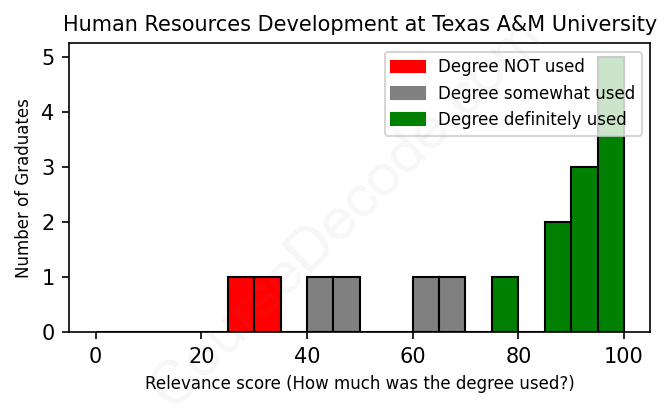
First, some facts. Of the Human Resources Development graduates from Texas A&M University we've analyzed , here's how many have used (or NOT used) their degree in their career:

These are estimates based on AI analysis of 17 LinkedIn profiles (see below).
The verdict? Above average. Overall, with an average relevance score of 76%, Human Resources Development graduates from Texas A&M University have a higher likelihood (+9%) of finding work in this field compared to the average graduate across all fields:
And for comparison, here's the chart for all profiles we've looked at across all degrees.
Also, after graduating, only 17% of these graduates have pursued further education other than another Bachelor's degree (such as a Masters degree or other), compared to the average across all profiles of 35%. This suggests a Bachelors degree is enough for most Human Resources Development graduates, and it's normal to look for work straight after graduation.
See the details:
|
Relevance score: 46% We think this person has gone into a career only somewhat relevant to their degree. We think this person has gone into a career only somewhat relevant to their degree.
DEGREE INFOGraduated in 2010 from Texas A&M University with a Bachelor of Science (B.S.) in Human Resources Development. No other secondary education since. JOB HISTORY SINCE GRADUATIONOperations Assistant U.S. VETS (United States Veterans Initiative) Jan 2010 - Jul 2010 Program Assistant  U.S. VETS (United States Veterans Initiative) Jul 2010 - Oct 2012 Operations Manager  U.S. VETS (United States Veterans Initiative) Oct 2012 - Jun 2018 Budget Analyst  The Harris Center for Mental Health and IDD Jun 2018 - Present ABOUTExperienced Operations Manager with a demonstrated history of working in the non-profit organization management industry. Skilled in Nonprofit Organizations, Event Planning, Customer Service, Strategic Planning, and Operational Planning. Strong operations professional with a Bachelor of Science (B.S.) focused in Human Resources Development from Texas A&M University. |
The top 10 most common jobs done by the graduates we've analyzed (ranked most common to least) are:
After diving into the career paths of Texas A&M graduates who studied Human Resources Development, it’s clear that a mix of job roles reflects the skills and knowledge they gained during their studies. Many of them stepped into roles like Human Resources Generalist, Recruiting Supervisor, and various positions within organizations focused on training, talent development, and operations management. These kinds of jobs are directly connected to HR principles, showcasing a solid application of their education. For example, roles like the HR Generalist and Training Manager involve hands-on HR tasks such as employee relations, recruitment, and talent management, which align perfectly with their degree specialization.
However, not all the jobs held by these graduates have been spot-on in relevance to Human Resources Development. Some have taken paths into finance, consulting, or other areas that drift from core HR practices, such as Budget Analyst or Consultant roles. These positions often prioritize different skill sets that aren't at the heart of HR, suggesting that while some graduates are effectively leveraging their education in HR-related fields, others might be exploring broader career opportunities that don’t directly utilize their HR expertise. So, while there’s a decent number of alumni thriving in HR-focused roles, there's also a sizeable chunk that has ventured into various fields, indicating a mixed but interesting career trajectory after their time at Texas A&M.
Here is a visual representation of the most common words in job titles for Human Resources Development graduates (this is across all Human Resources Development graduates we've analyzed, not just those who went to Texas A&M University):

Graduates from Texas A&M University with a degree in Human Resources Development seem to have solid and relevant career trajectories, especially in the early stages of their careers. Many begin with internships or entry-level roles in HR, such as HR Generalist or Operations Assistant, giving them a strong foothold in the industry right after graduation. For instance, graduates from the last decade have kicked off their careers working as HR interns or in recruiting roles, which helps build the skills needed for future advancements.
As these graduates progress, it's clear that many of them move into more senior roles over time. Within five years, you often see them becoming HR Managers, Talent Development Specialists, or even Vice Presidents in various organizations. Ten years out, they frequently hold prominent positions like Senior Consultants or Managers, demonstrating a clear upward trajectory in human resources and related fields. Overall, this indicates that a degree in Human Resources Development from Texas A&M not only sets graduates up for rewarding careers but also supports substantial growth in their chosen paths within the HR industry.
Getting a Bachelor’s degree in Human Resources Development, like the one at Texas A&M University, generally strikes a balance between being manageable and requiring some serious commitment. It’s not the easiest degree out there, but it’s also not a walk in the park. You’ll have to tackle topics like organizational behavior, training and development, and employment law, which can get a bit intense. However, if you stay organized, keep up with your readings, and engage in the coursework, you can definitely handle it. Plus, if you have a genuine interest in the subject, it can even be pretty enjoyable! So, while it might be a bit challenging, it’s definitely doable if you put in the effort.
Most commonly, in the LinkedIn profiles we've looked at, it takes people 4 years to finish a Bachelor degree in Human Resources Development.
Looking at the career paths of these Texas A&M grads, it seems like some of them are definitely making decent money, especially those who landed roles at big companies or climbed quickly up the ladder. For instance, the grad who became a Vice President at JPMorgan Chase right after a few years of experience is probably pulling in a pretty impressive salary. Others, like those in HR positions with steady progression, seem to be doing well too but might not be raking in the big bucks yet, especially if they’re still in the early stages of their careers. Overall, while not every single person appears to be hitting six figures right away, many have the potential to grow into well-paying roles as they gain experience and move up in their fields.
Here is a visual representation of the most common words seen in the "about" section of LinkedIn profiles who have a Bachelor degree in Human Resources Development (this is across all Human Resources Development graduates we've analyzed, not just those who went to Texas A&M University). This may or may not be useful:

Here are all colleges offering a Bachelor degree in Human Resources Development (ordered by the average relevance score of their Human Resources Development graduates, best to worst) where we have analyzed at least 10 of their graduates:
| College | Score | Count |
|---|---|---|
 Oakland University Oakland University
|
85 | 17 |
 Texas A&M University Texas A&M University
|
76 | 17 |
 University of Houston University of Houston
|
69 | 10 |